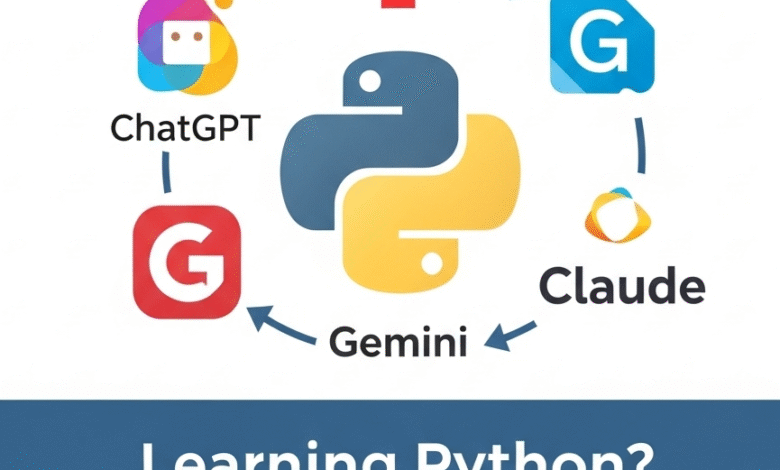
So, you’ve decided to learn Python. That’s awesome. Welcome to a world of powerful, creative, and rewarding programming. But as you start, you’ll quickly run into a dozen questions for every line of code you write. What’s a “dictionary”? Why did my code just crash? Is this the “right” way to do this?
In the past, you’d have to dig through dense documentation or hope for a kind soul on Stack Overflow. Today, you have a new option: an AI coding assistant.
But now there’s a new problem. With giants like ChatGPT, Google’s Gemini, and Anthropic’s Claude all vying for your attention, which one is actually helpful for a complete beginner? Most reviews are written for professional developers, focusing on complex tasks. We’re going to ignore all that.
This guide is for you—the person learning what a for loop is. We’ll break down which of these AI giants is the best teacher, the most patient tutor, and the most helpful buddy for your Python learning journey in 2025.
What We’re Judging: The Beginner’s Scorecard
We’re not looking at who can build a complex web app in ten seconds. We’re judging them on the things that matter when you’re starting from zero:
- Clarity of Explanations: Who explains concepts like a patient teacher, not a robot?
- Code Quality & Simplicity: Who writes clean, simple, easy-to-understand Python code?
- Debugging Help: Who is best at figuring out why your code is broken and explaining the fix without making you feel dumb?
- The “No Stupid Questions” Feel: Which AI encourages you to ask the most basic questions and gives supportive answers?
Let’s see how they stack up.
ChatGPT: The Enthusiastic Brainstormer
Think of ChatGPT as the creative, super-smart friend who’s always excited to help you start a project. It’s fantastic at generating ideas and writing fresh code from a simple prompt.
Where it Shines for Beginners:
- Getting Started Quickly: You can say, “Write me a simple Python script that guesses a number,” and it will spit out working, well-commented code almost instantly. This is great for seeing a finished product and working backward.
- Creative Examples: It’s good at coming up with fun, relatable examples. Asking it to explain a
classusing a “car” analogy is right up its alley.
Where it Falls Short for Beginners:
- The Confidence Problem: ChatGPT can sometimes be “confidently wrong.” It might present an older, outdated way of doing things or even invent a function that doesn’t exist. For a beginner who can’t spot the error, this can be incredibly confusing.
- Can Be Too Concise: Sometimes, its explanations are brief. It tells you what the code does but might not explain why it does it that way, which is the most important part of learning.
Verdict: ChatGPT is like a rocket booster. It’s amazing for getting off the ground and seeing what’s possible, but you need to be careful it doesn’t fly you in the wrong direction. Best for project ideas and quick code examples.
Claude: The Patient, Methodical Professor
If ChatGPT is the creative brainstormer, Claude is the thoughtful professor who wants to make sure you truly understand the material. It prioritizes clarity, safety, and step-by-step thinking.
Where it Shines for Beginners:
- Verbose, Beginner-Friendly Explanations: This is Claude’s superpower. When you ask it to explain a concept, it often gives a longer, more detailed answer. It breaks down code line-by-line and explains the “why” behind each decision. For learning, this is golden.
- Great at Understanding Your Code: Claude is excellent at analyzing existing code. You can paste in your broken script and say, “I’m a beginner, can you tell me what’s wrong with this in simple terms?” It excels at finding the error and walking you through the fix patiently.
- Cautious and Safe: Claude is less likely to generate buggy or outdated code. It tends to stick to proven, standard methods, which is exactly what a beginner needs.
Where it Falls Short for Beginners:
- Can Be a Bit “Wordy”: Sometimes, you just want a quick code snippet, and Claude might give you a mini-lecture. This thoroughness is usually a pro, but can occasionally slow you down.
- Less “Creative” in a Fun Way: It might stick to more traditional, textbook-style examples compared to ChatGPT’s sometimes more playful analogies.
Verdict: Claude is the best pure teacher. It feels like a dedicated tutor who won’t let you move on until you’ve grasped the fundamentals. Best for deep understanding and debugging your own code.
Gemini: The Factual, Context-Aware Librarian
Gemini, being a Google product, has the full force of the internet behind it. Think of it as a super-librarian who has read every textbook and every piece of documentation and can give you a fast, factual, up-to-date answer.
Where it Shines for Beginners:
- Up-to-Date and Factual: Gemini is less likely to suggest deprecated code because it has more recent information. It’s excellent at answering factual questions like, “What’s the most efficient way to merge two dictionaries in the latest version of Python?”
- Excellent Code Explanation: Like Claude, Gemini is very good at taking a piece of code and explaining it. Its integration with the Google ecosystem means it’s built for understanding and processing information accurately.
- Good at “Thinking”: Gemini excels at step-by-step reasoning. If you give it a problem, it can often show its work, making it easier for you to follow its logic.
Where it Falls Short for Beginners:
- Can Be Overly Technical: Because it’s so factual, its explanations can sometimes feel like you’re reading official documentation. It might lack the gentle, simplified touch of Claude.
- Code Can Sometimes Need Polishing: While its code is generally accurate, some users find they need to make small tweaks to get it running perfectly, which can be a hurdle for beginners.
Verdict: Gemini is the reliable reference book on your shelf. It gives you the most accurate, modern answers and is a trustworthy source of truth. Best for factual questions and understanding modern Python standards.
Final Recommendation: So Who Should You Choose?
For a complete beginner learning Python in 2025, there is a clear winner, but the real answer is nuanced.
The Overall Winner for Learning is… Claude.
Its combination of detailed, beginner-focused explanations, its patient tone when debugging, and its cautious approach to code generation make it the ideal learning companion. It acts most like a real teacher, which is precisely what you need when you’re starting out.
However, the best strategy is to use them all:
- Start with Claude: Use it to understand core concepts (
forloops, functions, lists, etc.) and to help you when your own code breaks. Ask it “stupid questions.” It won’t mind. - Jump to ChatGPT for Ideas: Once you have the basics, ask ChatGPT, “Give me a fun beginner project idea using lists and functions.” Use it to spark creativity.
- Consult Gemini for “Best Practices”: When you have working code but wonder, “Is this the best way to do this?”, ask Gemini. Use it to check for modern standards and efficiency.
Ultimately, think of these AIs not as tools that write code for you, but as tireless tutors that help you understand how to write it yourself. Happy coding!



